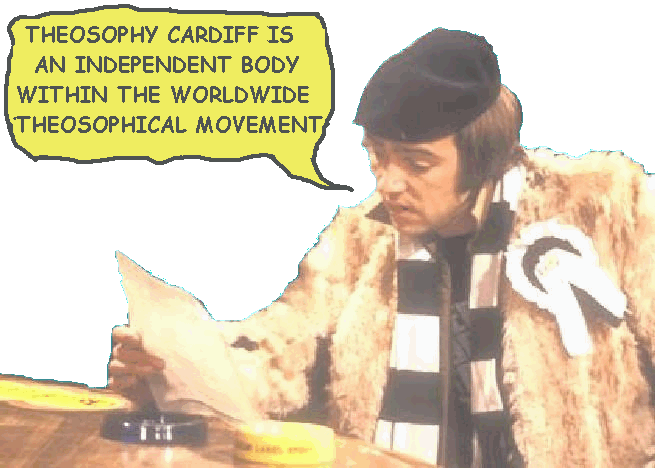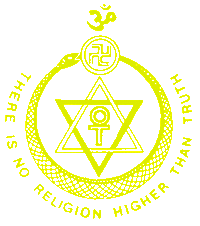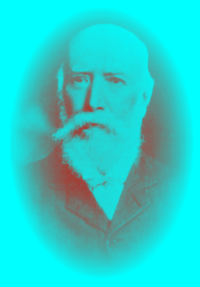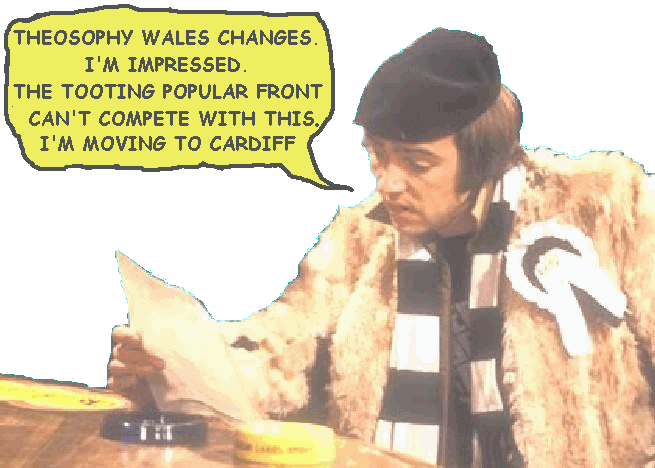VANGUARD
Phase
1 Standard Vanguard introduced July 1947
The Standard Vanguard was produced
by
the Standard Motor Company
in
The Standard Vanguard has very little (in fact
nothing)
to do with Theosophy but we have found that
Theosophists and new enquirers do like pictures
of classic cars and we get a lot of positive
feedback.
You can find Theosophy Wales groups
in
Bangor, Cardiff, Conwy
& Swansea
Theosophy Wales has no controlling
body
and is made up of
independent groups
________________________
Theosophy
we are pleased to present here an in depth manual
of Theosophical ideas and concepts by Alfred Percy Sinnett
who
was a major contributor to the development of modern Theosophy in the early
years of the Theosophical movement
Esoteric
Buddhism
By
Alfred
Percy Sinnett
The Constitution of Man
Chapter 2
A SURVEY of Cosmogony, as
comprehended by occult science, must precede any attempt to explain the means
by which a knowledge of that cosmogony itself has been acquired. The methods of
esoteric research have grown out of natural facts, with which exoteric science
is wholly unacquainted. These natural facts are concerned with the premature
development in occult adepts of faculties, which mankind at large has not yet
evolved; and these faculties, in turn, enable their possessors to explore the
mysteries of Nature, and verify the esoteric doctrines, setting forth its grand
design. The practical student of occultism may develop the faculties first and
apply them to the observation of Nature afterwards, but the exhibition of the
theory of Nature for Western readers merely seeking its intellectual
comprehension, must precede consideration of the inner senses, which occult
research employs. On the other hand, a survey of cosmogony, as comprehended by
occult science, could only be scientifically arranged at the expense of
intelligibility for European readers. To begin at the beginning, we should endeavour to realize the state of the universe before
evolution sets in. This subject is by no means shirked by esoteric students,
and later on, in the course of this sketch, some hints will be given concerning
the views occultism entertains of the earlier processes through which cosmic
matter passes on its way to evolution. But an orderly statement of the earliest
processes of Nature would embody references to man’s spiritual constitution,
which would not be understood without some preliminary explanation.
Seven distinct principles are
recognized by esoteric science, as entering into the constitution of man. The
classification differs so widely from any with which European readers will be
familiar that I shall naturally be asked for the grounds on which occultism
reaches so far-fetched a conclusion. But I must, on account of inherent
peculiarities in the subject, which will be comprehended later on, beg for this
Oriental knowledge I am bringing home, a hearing (in the first instance at all
events) of the Oriental kind. The Oriental and the European systems of
conveying knowledge are as unlike as any two methods can be. The West pricks
and piques the learner’s controversial instinct at every step. He is encouraged
to dispute and resist conviction. He is forbidden to take any scientific
statement on authority. Pari Passu, as he acquires knowledge, he must learn how that
knowledge has been acquired, and he is made to feel that no fact is worth
knowing, unless he knows, with it, the way to prove it a fact. The East manages
its pupils on a wholly different plan. It no more disregards the necessity of
proving its teaching than the West, but it provides proof of a wholly different
sort. It enables the student to search Nature for himself, and verify its
teachings, in those regions which Western philosophy can only invade by
speculation and argument. It never takes the trouble to argue about anything.
It says: - “So and so is fact; here is the key of knowledge; now go and see for
yourself.” In this way it comes to pass that teaching per se is never
anything else but teaching on authority. Teaching and proof do not go hand in
hand; they follow one another in due order. A further consequence of this
method is that Eastern philosophy employs the method which we in the West have
discarded for good reasons as incompatible with our own line of intellectual
development - the system of reasoning from generals to particulars. The
purposes which European science usually has in view would certainly not be
answered by that plan, but I think that any one who goes far in the present
inquiry will feel that the system of reasoning up from the details of knowledge
to general inferences is inapplicable to the work in hand. One cannot
understand details in this department of knowledge till we get a general
understanding of the whole scheme of things. Even to convey this general
comprehension by mere language, is a large and by no means an easy task. To
pause at every moment of the exposition in order to collect what separate
evidence may be available for the proof of each separate statement, would be
practically impossible. Such a method would break down the patience of the
reader, and prevent him from deriving, as he may from a more condensed
treatise, that definite conception as to what the esoteric doctrine means to
teach, which it is my business to evoke.
This reflection may suggest,
in passing, a new view, having an intimate connection with our present subject,
of the Platonic and Aristotelian systems of reasoning. Plato’s system, roughly described
as reasoning from universals to particulars, is condemned by modern habits in
favour of the later and exactly inverse system. But Plato was in fetters in
attempting to defend his system. There is every reason to believe that his
familiarity with esoteric science prompted his method, and that the usual
restrictions under which he laboured as an initiated occultist, forbade him
from saying as much as would really justify it. No one can study even as much
occult science as this volume contains, and then turn to Plato or even to any
intelligent epitome of Plato’s system of thought, without finding
correspondences cropping out at every turn.
The higher principles of the
series which go to constitute Man are not fully developed in the mankind with
which we are as yet familiar, but a complete or perfect man would be resolvable
into the following elements. To facilitate the application of these
explanations to ordinary exoteric Buddhist writings the Sanskrit names of these
principles are given as well as suitable terms in English. [The nomenclature
here adopted differs slightly from that hit upon when some of the present
teachings were first given out in a fragmentary form in the Theosophist. Later
on it will be seen that the names now preferred embody a fuller conception of
the whole system, and avoid some difficulties to which the earlier names give
rise. If the earlier presentations of esoteric science were thus imperfect, one
can hardly be surprised at so natural a consequence of the difficulties under which
its English exponents laboured. But no substantial errors have to be confessed
or deplored. The connotations of the present names are more accurate than those
of the phrases first selected, but the explanations originally given, as far as
they went, were quite in harmony with those now developed.].
|
1 |
The Body |
Rûpa |
|
2 |
Vitality |
Prana, or Jîva |
|
3 |
Astral Body |
Linga Sharira |
|
4 |
Animal Soul |
Kâma Rûpa |
|
5 |
Human Soul |
Manas |
|
6 |
Spiritual Soul |
Buddhi |
|
7 |
Spirit |
Âtma |
Directly conceptions, so
transcendental as some of those included in this analysis, are set forth in a
tabular statement, they seem to incur certain degradation, against which, in endeavouring to realize clearly what is meant, we must be ever
on our guard. Certainly it would be impossible for even the most skilful
professor of occult science to exhibit each of these principles separate and
distinct from the others, as the physical elements of a compound body can be
separated by analysis and preserved independently of each other. The elements
of a physical body are all on the same plane of materiality, but the elements
of man are on very different planes. The finest gases of which the body may to
some extent be chemically composed, are still, on one scale at all events, on
nearly the lowest level of materiality. The second principle which, by its
union with gross matter, changes if from what we generally call inorganic, or
what might more properly be called inert, into living matter, is at once a
something different from the finest example of matter in its lower state. Is
the second principle then anything that we can truly call matter at all? The
question lands us, thus, at the very outset of this inquiry, in the middle of
the subtle metaphysical discussion as to whether force and matter are different
or identical. Enough for the moment to state that occult science regards them
as identical, and that it contemplates no principle in Nature as wholly
immaterial. In this way, though no conceptions of the universe, of man’s
destiny, or of Nature generally, are more spiritual than those of occult
science, that science is wholly free from the logical error of attributing
material results to immaterial causes. The esoteric doctrine is thus really the
missing link between materialism and spirituality.
The clue to the mystery
involved, lies of course in the fact, directly cognizable by occult experts,
that matter exists in other states besides those which are cognizable by the
five senses.
The second principle of Man,
Vitality, thus consists of matter in its aspect as force, and its affinity for
the grosser state of matter is so great that it cannot be separated from any
given particle or mass of this, except by instantaneous translation to some
other particle or mass. When a man’s body dies, by desertion of the higher
principles which have rendered it a living reality, the second, or life
principle, no longer a unity itself, is nevertheless inherent still in the
particles of the body as this decomposes, attaching itself to other organisms
to which that very process of decomposition gives rise. Bury the body in the
earth and its jîva will attach itself to the
vegetation which springs above, or the lower animal forms which evolve from its
substance. Burn the body, and indestructible jîva
flies back none the less instantaneously to the body of the planet itself from
which it was originally borrowed, entering into some new combination as its
affinities may determine.
The third principle, the
Astral Body or Linga Sharira,
is an ethereal duplicate of the physical body, its original design. It guides jîva in its work on the physical particles, and causes it
to build up the shape which these assume. Vitalized itself by the higher
principles, its unity is only preserved by the union of the whole group. At
death it is disembodied for a brief period, and, under some abnormal
conditions, may even be temporarily visible to the external sight of still
living persons. Under such conditions it is taken of course for the ghost of
the departed person. Spectral apparitions may sometimes be occasioned in other
ways, but the third principle, when that results in a visible
phenomenon, is a mere aggregation of molecules in a peculiar state, having no
life or consciousness of any kind whatever. It is no more a Being, than any
cloud wreath in the sky which happens to settle into the semblance of some
animal form. Broadly speaking, the linga sharira never leaves the body except at death, nor migrates
far from the body even in that case. When seen at all, and this can but rarely
occur, it can only be seen near where the physical body still lies. In some
very peculiar cases of spiritualistic mediumship, it
may for a short time exude from the physical body and be visible near it, but
the medium in such cases stands the while in considerable danger of his life.
Disturb unwillingly the conditions under which the linga
sharira was set free, and its return might be
impeded. The second principle would then soon cease to animate the physical body
as a unity, and death would ensue.
During the last year or two,
while hints and scraps of occult science have been finding their way out into
the world, the expression, “Astral Body,” has been applied to a certain
semblance of the human form, fully inhabited by its higher principles, which
can migrate to any distance from the physical body - projected consciously and
with exact intention by a living adept, or unintentionally, by the accidental
application of certain mental forces to his loosened principles, by any person
at the moment of death. For ordinary purposes there is no practical
inconvenience in using the expression “Astral Body” for the appearance to
projected - indeed, any more strictly accurate expression, as will be seen
directly, would be cumbersome, and we must go on using the phrase in both
meanings. No confusion need arise; but, strictly speaking, the linga sharira, or third
principle, is the astral body, and that cannot be sent about as the vehicle of
the higher principles.
The three lower principles,
it will be seen, are altogether of the earth, perishable in their nature as a
single entity, though indestructible as regards their molecules, and absolutely
done with by man at his death.
The fourth principle is the
first of those which belong to man’s higher nature. The Sanskrit designation, kâma rûpa, is often
translated “Body of Desire,” which seems rather a clumsy and inaccurate form of
words. A closer translation, having regard to meanings rather than words,
would, perhaps, be “Vehicle of Will,” but the name already adopted above,
Animal Soul, may be more accurately suggestive still.
In the Theosophist for
October, 1881, when the first hints about the septenary
constitution of man were given out, the fifth principle was called the animal
soul, as contra-distinguished from the sixth or “spiritual soul;” but though
this nomenclature sufficed to mark the required distinction, it degraded the
fifth principle, which is essentially the human principle. Though humanity is
animal in its nature as compared with spirit, it is elevated above the
correctly defined animal creation in every other aspect. By introducing a new
name for the fifth principle, we are enabled to throw back the designation
“animal soul” to its proper place. This arrangement need not interfere,
meanwhile, with an appreciation of the way in which the fourth principle is the
seat of that will or desire to which the Sanskrit name refers. And, withal, the
kâma rûpa is the
animal soul, the highest developed principle of the brute creation,
susceptible of evolution into something far higher by its union with the
growing fifth principle in man, but still the animal soul which man is by no
means yet without, the seat of all animal desires, and a potent force in the
human body as well, pressing upwards, so to speak, as well as downwards, and
capable of influencing the fifth, for practical purposes, as well as of being
influenced by the fifth for its own control and improvement.
The fifth principle, human soul,
or Manas (as described in Sanskrit in one of its aspects), is the seat of
reason and memory. It is a portion of this principle, animated by the
fourth, which is really projected to distant places by an adept, when he makes
an appearance in what is commonly called his astral body.
Now the fifth principle, or
human soul, in the majority of mankind is not even yet fully developed. This
fact about the imperfect development as yet of the higher principles is very
important. We cannot get a correct conception of the present place of man in
Nature if we make the mistake of regarding him as a fully perfected being
already. And that mistake would be fatal to any reasonable anticipations
concerning the future that awaits him - fatal also to any appreciation of the
appropriateness of the future which the esoteric doctrine explains to us as
actually awaiting him.
Since the fifth principle is
not yet fully developed, it goes without saying that the sixth principle is
still in embryo. This idea has been variously indicated in recent forecasts of
the great doctrine. Sometimes it has been said, we do not truly possess any
sixth principle, we merely have germs of a sixth principle. It has also been
said, the sixth principle is not in us; it hovers over us; it is a something
that the highest aspirations of our nature must work up towards. But it is also
said: - All things, not man alone, but every animal, plant, and mineral have
their seven principles, and the highest principles of all - the seventh itself
- vitalizes that continuous thread of life which runs all through evolution,
uniting into a definite succession, the almost innumerable incarnations of that
one life which constitute a complete series. We must imbibe all these various
conceptions and weld them together, or extract their essence, to learn the
doctrine of the sixth principle. Following the order of ideas which just now
suggested the application of the term animal soul to the fourth principle, and
human soul to the fifth, the sixth may be called the spiritual soul of man, and
the seventh, therefore, spirit itself.
In another aspect of the idea
the sixth principle may be called the vehicle of the seventh, and the fourth
the vehicle of the fifth; but yet another mode of dealing with the problem
teaches us to regard each of the higher principles from the fourth upwards, as
a vehicle of what, in Buddhist philosophy, is called the One Life or Spirit.
According to this view of the matter of one life is that which perfects, by
inhabiting the various vehicles. In the animal the one life is concentrated in
the kâma rûpa. In
man it begins to penetrate the fifth principle as well. In perfected man it
penetrates the sixth, and when it penetrates the seventh, man ceases to be man,
and attains a wholly superior condition of existence.
This latter view of the
position is especially valuable as guarding against the notion that the four
higher principles are like a bundle of sticks tied together, but each having
individualities of their own if untied. Neither the animal soul alone, nor the
spiritual soul alone, has any individuality at all; but, on the other hand, the
fifth principle would be incapable of separation from the others in such a way,
that its individuality would be preserved while both the deserted principles would
be left unconscious. It has been said that the finer principles themselves
even, are material and molecular in their constitution, though composed of a
higher order of matter than the physical senses can take note of. So they are
separable, and the sixth principle itself can be imagined as divorcing itself
from its lower neighbour. But in that state of
separation, and at this stage of mankind’s development, it could simply
reincarnate itself in such an emergency, and grow a new fifth principle by
contact with a human organism; in such a case, the fifth principle would lean
upon and become one with the fourth, and be proportionately degraded. And yet
this fifth principle, which cannot stand alone, is the personality of the man;
and its cream, in union with the sixth, his continuous individuality through
successive lives.
The circumstances and
attractions under the influence of which the principles do divide up, and the
manner in which the consciousness of man is dealt with then, will be discussed
later on. Meanwhile, a better understanding of the whole position than could
ensue from a continued prosecution of the inquiry on these lines now, will be
obtained by turning first to the processes of evolution by means of which the
principles of man have been developed.
ANNOTATIONS
Some objection has been
raised to the method in which the Esoteric Doctrine is presented to the reader
in this book, on the ground that it is materialistic. I doubt if in any other
way the ideas to be dealt with could so well be brought within the grasp of the
mind, but it is easy, when they once are grasped, to translate them into terms
of idealism. The higher principles will be the better susceptible of treatment
as so many different states of the Ego, when the attributes of these states
have been separately considered as principles undergoing evolution. But it may
be useful to dwell for awhile on the view of the human constitution according
to which the consciousness of the entity migrates successively through the
stages of development, which the different principles represent.
In the highest evolution we
need concern ourselves with at present - that of the perfected Mahatma - it is
sometimes asserted in occult teaching that the consciousness of the Ego has
acquired the power of residing altogether in the sixth principle. But it would
be a gross view of the subject, and erroneous, to suppose that the Mahatma has
on that account shaken off altogether, like a discarded sheath or sheaths, the
fourth and fifth principles, in which his consciousness may have been seated
during an earlier stage of his evolution. The entity, which was the
fourth or fifth principle before, has come now to be different in its
attributes, and to be entirely divorced from certain tendencies or
dispositions, and is therefore a sixth principle. The change can be
spoken of in more general terms as an emancipation of the adept’s nature from
the enthralments of his lower self, from desires of
the ordinary earth-life - even from the limitations of the affections; for the Ego,
which is entirely conscious in his sixth principle, has realized the unity of
the true Egos of all mankind on the higher plane, and can no longer be drawn by
bonds of sympathy to any one more than to any other. He has attained that love
of humanity as a whole which transcends the love of the Maya or illusion
which constitutes the separate human creature for the limited being on the
lower levels of evolution. He has not lost his fourth and fifth
principles, - these have themselves attained Mahatmaship;
just as the animal soul of the lower kingdom, in reaching humanity, has
blossomed into the fifth state. That consideration helps us to realize more
accurately the passage of ordinary human beings through the long series of
incarnations of the human plane. Once fairly on that plane of existence the
consciousness of the primitive man gradually envelopes the attributes of the
fifth principle. But the Ego at first remains a centre of thought activity
working chiefly with impulses and desires of the fourth stage of evolution.
Flashes of the higher human reason illumine it fitfully at first, but by
degrees the more intellectual man grows into the fuller possession of this. The
impulses of human reason assert themselves more and more strongly. The
invigorated mind becomes the predominant force in the life. Consciousness is
transferred to the fifth principle, oscillating, however, between the
tendencies of the lower and higher nature for a long while - that is to say,
over vast periods of evolution and many hundred lives, - and thus gradually
purifying and exalting the Ego. All this while the Ego is thus a unity in one
aspect of the matter, and its sixth principle but a potentiality of ultimate
development. As regards the seventh principle, that is the true Unknowable, the
supreme controlling cause of all things, which is the same for one man as for
every man, the same for humanity as for the animal kingdom, the same for the
physical as for the astral or devachanic or nirvanic planes of existence. No one man has got a seventh
principle, in the higher conception of the subject: we are all in the same
unfathomable way overshadowed by the seventh principle of the cosmos.
How does this view of the
subject harmonize with the statement in the foregoing chapter, that in a certain
sense the principles are separable, and that the sixth even can be imagined as
divorcing itself from its next lower neighbour, and,
by reincarnation, as growing a new fifth principle by contact with a human
organism? There is no incompatibility in the spirit of the two views. The
seventh principle is one and indivisible in all Nature, but there is a
mysterious persistence through it of certain life impulses, which thus
constitute threads on which successive existences may be strung. Such a life
impulse does not expire even in the extraordinary case supposed, in which an
Ego, projected upon it and developed along it to a certain point, falls away
from it altogether and as a complete whole. I am not in a position to dogmatize
with precision as to what happens in such a case, but the subsequent
incarnations of the spirit along that line of impulse are clearly of the
original sequence; and thus, in the materialistic treatment of the idea, it may
be said, with as much approach to accuracy as language will allow in either
mode, that the sixth principle of the fallen entity in such a case separates
itself from the original fifth, and reincarnates on its own account.
But with these abnormal
processes it is unnecessary to occupy ourselves to any great extent. The normal
evolution is the problem we have first to solve; and while the consideration of
the seven principles as such is, to my own mind, the most instructive method by
which the problem can be dealt with, it is well to remember always that the Ego
is a unity progressing through various spheres or states of being, undergoing
change and growth and purification all through the course of its evolution, -
that it is a consciousness seated in this, or that, or the other, of the
potential attributes of a human entity.

Standard
Vanguard Brochure Cover Late 1940s
In
1949 you could buy a Vanguard for £671 (including purchase tax)
_____________________________
More Theosophy Stuff
with these links
Cardiff Theosophical
Society meetings are informal
and there’s always a cup of tea afterwards
The
Cardiff Theosophical Society Website

1948
Standard Vanguard
The
National Wales Theosophy Website
Bangor,
Cardiff, Conwy & Swansea
If you
run a Theosophy Group, please feel free
to use any of the
material on this site

1953
Standard Vanguard Pickup
The Most Basic Theosophy
Website in the Universe
A quick overview of Theosophy
and the Theosophical Society
If you run a Theosophy Group you
can use this as an introductory handout.
Theosophy Cardiff’s Instant Guide

Phase
II Standard Vanguard 1953 -55
Theosophical Movement in Wales
as
it separates into independent
groups that run do their own show
One liners and quick explanations
H P
Blavatsky is usually the only
Theosophist
that most people have ever
heard of. Let’s put
that right
The Voice of the Silence Website

Phase
III Standard Vanguard Circa 1959
An
Independent Theosophical Republic
Links
to Free Online Theosophy
Study
Resources; Courses, Writings,
The main criteria for the inclusion of
links on this site is that they have some
relationship (however tenuous) to Theosophy
and are lightweight, amusing or entertaining.
Topics include Quantum Theory and Socks,
Dick Dastardly and Legendary Blues Singers.
A selection of articles on Reincarnation
Provided in response to the large
number of enquiries we receive at
Cardiff Theosophical Society on this subject

Phase
III Standard Vanguard Circa 1962
The Voice of the Silence Website
This is for
everyone, you don’t have to live
in Wales to make
good use of this Website

A
Phase I 1949 Standard Vanguard with sidelights
A Vanguard tested by The Motor magazine in 1949 had
a top speed of 78.7 mph
(126.7 km/h) and could accelerate from 0-60 mph
(97 km/h) in 21.5 seconds.
A fuel consumption of 22.9 miles per imperial
gallon
No
Aardvarks were harmed in the

Phase
III Standard Vanguard Early 60s
Within the British Isles, The
Adyar Theosophical Society has Groups in;
Bangor*Basingstoke*Billericay*Birmingham*Blackburn*Bolton*Bournemouth
Bradford*Bristol*Camberley*Cardiff*Chester*Conwy*Coventry*Dundee*Edinburgh
Folkstone*Glasgow*Grimsby*Inverness*Isle
of Man*Lancaster*Leeds*Leicester
Letchworth*London*Manchester*Merseyside*Middlesborough*Newcastle upon Tyne
North Devon*Northampton*Northern Ireland*Norwich*Nottingham
Perth*Republic of Ireland*Sidmouth*Southport*Sussex*Swansea*Torbay
Tunbridge Wells*Wallasey*Warrington*Wembley*Winchester*Worthing
The Spiritual Home of Urban Theosophy
The Earth Base for Evolutionary Theosophy
_____________________
Concerns about the fate of the
wildlife as
Tekels Park is to be Sold to a
Developer
Concerns are raised about the fate of
the wildlife as
The Spiritual Retreat, Tekels Park in
Camberley,
Surrey, England is to be sold to a
developer.
Tekels Park is a 50 acre woodland
park, purchased
for the Adyar Theosophical Society in England
in 1929.
In addition to concern about the
park, many are
worried about the future of the Tekels Park
Deer
as they are not a protected species.
Anyone planning a “Spiritual” stay at
the
Tekels Park Guest House should be
aware of the sale.
It doesn’t require a Diploma in Finance
and even someone
with a Diploma in
Astral Travel will know that this is a
bad time economically to sell Tekels Park
____________________
A
B
C
D
EFG
H
IJ
KL
M
N
OP
QR
S
T
UV
WXYZ
Complete Theosophical Glossary in Plain Text Format
1.22MB
Quick
Explanations with Links to More Detailed Info
What is Theosophy ? Theosophy Defined (More Detail)
Three Fundamental Propositions Key Concepts of Theosophy
Cosmogenesis
Anthropogenesis
Root Races
Karma
Ascended Masters After Death States
Reincarnation
The Seven Principles of Man Helena Petrovna Blavatsky
Colonel Henry Steel Olcott William Quan Judge
The Start of the Theosophical Society
History of the Theosophical Society
Theosophical Society Presidents
History of the Theosophical Society in Wales
The Three Objectives of the Theosophical Society
Explanation of the Theosophical Society Emblem
Glossaries of Theosophical Terms
An Outstanding Introduction to Theosophy
By a student of Katherine Tingley
Elementary Theosophy Who is the Man? Body and Soul
Body, Soul and Spirit Reincarnation Karma

Standard
Vanguard Promotional Literature Late 1940s
What Theosophy Is From the Absolute to Man
The Formation of a Solar System The Evolution of Life
The Constitution of Man After Death Reincarnation
The Purpose of Life The Planetary Chains
The Result of Theosophical Study
An Outline of Theosophy
Charles Webster Leadbeater
Theosophy - What it is How is it Known? The Method of Observation
General Principles The Three Great Truths The Deity
Advantage Gained from this
Knowledge The Divine Scheme
The Constitution of Man The True Man Reincarnation
The Wider Outlook Death Man’s Past and Future
Cause and Effect What Theosophy does for us

Standard Vanguard Estate
Circa 1952
Try these if you are looking
for a local
Theosophy Group or Centre
UK Listing of Theosophical Groups
Please tell us about your UK Theosophy Group
___________________
into categories and presented according to relevance of
website.
Web Directory
- Add Link - Submit Article - Online Store - Forum

Standard
Vanguard Van Circa 1952
______________________

General pages about Wales, Welsh History
and The History of Theosophy in Wales
Wales is a
Principality within the United Kingdom and has an eastern
border with England. The
land area is just over 8,000 square miles.
Snowdon in North Wales is
the highest mountain at 3,650 feet.
The coastline is almost
750 miles long. The population of Wales
as at the 2001 census is 2,946,200.
________________

Bangor Conwy
& Swansea Lodges are members
of the Welsh
Regional Association (Formed 1993).
Theosophy Cardiff separated from the
Welsh Regional
Association in March 2008 and became an independent
body within the Theosophical Movement in March 2010
High
Drama & Worldwide Confusion
as Theosophy
Cardiff Separates from the
Welsh
Regional Association (formed 1993)
Theosophy Cardiff cancels its Affiliation
to the Adyar Based Theosophical Society
Cardiff, Wales,
UK, CF24 – 1DL




